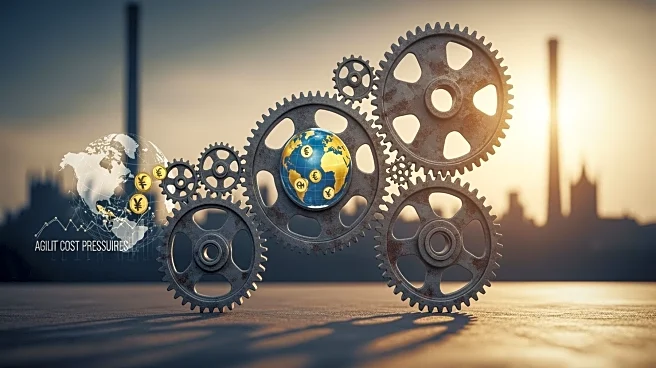What's Happening?
The 2025 Industrial Agility Assessment from HSO and The Manufacturer reveals a significant decline in industrial agility among UK manufacturers and distributors, reaching its lowest level in five years.
Only 45% of companies now consider themselves 'highly or extremely agile,' down from 58% last year. The report attributes this decline to sustained disruption, geopolitical instability, cost pressures, and talent shortages. Despite efforts to adapt, confidence and flexibility have eroded, leading to 'agility fatigue.' The report notes that while manufacturers demonstrated flexibility during the pandemic, maintaining agility amid overlapping crises such as inflation, labor costs, and volatile demand is challenging. Executives cite risk aversion and a defensive investment climate as constraints on agility.
Why It's Important?
The decline in industrial agility has significant implications for the UK's manufacturing sector, affecting its ability to respond to global challenges and maintain competitiveness. Geopolitical instability, cost pressures, and talent shortages are key factors contributing to this decline. As manufacturers face increased risk aversion, their ability to innovate and adapt is constrained, potentially impacting productivity and growth. The report highlights the importance of digital transformation as a key enabler of agility, with manufacturers prioritizing automation, planning improvements, and AI adoption. However, progress remains uneven, particularly for smaller firms facing barriers related to investment capacity, skills, and legacy infrastructure.
What's Next?
Manufacturers are expected to focus on improving agility, introducing AI to enhance decision-making, and reducing the time and cost of launching new products over the next 12-24 months. The emphasis will be on stability and measured investment rather than aggressive expansion. Executives are prioritizing operational discipline and profitability, shifting from pure growth to profitable growth. This cautious approach reflects the need to balance technology investment, workforce capability, and risk management without exhausting resources. As manufacturers strengthen their foundations, they aim to build resilience, efficiency, and flexibility to adapt to future changes.
Beyond the Headlines
The report highlights the ethical and cultural dimensions of industrial agility, emphasizing the need for sustainable adaptation without exhausting people or resources. The shift from large-scale transformation to targeted, incremental improvements reflects a pragmatic approach to change. Manufacturers are investing in technologies that deliver tangible efficiency gains and resilience, rather than pursuing transformative change for its own sake. This focus on resilience over reinvention underscores the importance of building solid foundations for the next wave of change, ensuring that the sector can adapt sustainably to future challenges.










